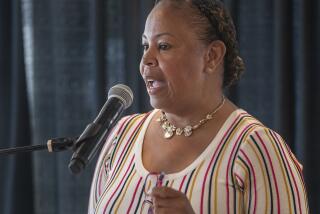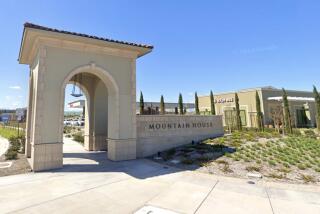Laguna Hills City Manager Expects to Move His Office Out of His Car : Cityhood: Council will convene today to conduct the first business of county’s 30th municipality.
Bruce Channing, the new city manager of Laguna Hills, has literally been running the city from the trunk of his car for the last three months.
But sometime next week, Channing expects to have a telephone, desk and file cabinets moved into 9,000 square feet of commercial space that the city is leasing for its city hall at 25201 Paseo de Alicia. On inauguration day, the place is just a few days shy of being ready for its full-time occupants.
But with or without carpet and wallpaper, the Laguna Hills City Council will convene a public hearing there at 2 p.m. today to conduct its first official business.
“Maybe the concrete floor and exposed drywall will add a little charm,” joked Councilwoman-elect Melody Carruth in an interview earlier this week.
Because council members will be sworn in at a 9 a.m. ceremony in the gym of Laguna Hills High School, Laguna Hills will beat Lake Forest to become the county’s 30th municipality. The Lake Forest inaugural will take place later in the morning.
But regardless of their previous semi-official status, council members have been busy for several months guiding the new community. As members of a “review board” advising the County Planning Commission, Carruth said the Laguna Hills council members had already begun to cut their teeth on planning issues. They took a stand against plans to build a business park near Leisure World--a battle that they lost when the county approved the project.
However, as a full-fledged City Council, they will review plans to add a 580,000-square-foot second story to the Laguna Hills Mall. The developer’s report on the environmental impact of the expansion is expected to go before the council early next year.
Carruth said that although the mall expansion will generate new income for Laguna Hills--an estimated $3 million a year in additional sales and property tax revenue--she is concerned about the additional traffic. “I think we will be faced with striking a balance between quality of life and creating an environment for our business community to flourish,” she said.
Laguna Hills city officials say they also will give high priority to improving recreation programs for the city’s youth. “There is a tremendous lack of ball fields,” said Laguna Hills City Councilman Joel Laudenschleger.
In addition, Laudenschleger said, “crime seems to be on the increase and we want to get a handle on it.” He said the council will ask for more police protection when the city negotiates a new contract with the Sheriff’s Department.
Council members have also pledged to try to annex north Laguna Hills to the new city. The Local Agency Formation Commission lopped this community of 5,000 residents off the area originally approved for incorporation. However, Channing said he doesn’t expect an annexation proposal to be pushed by the city in the first six months.
“The most pressing issue in the first six months is to get government organization in place and prepare to deliver services to the community,” Channing said. He said the city will be choosing private providers of municipal services ranging from street sweeping to tree trimming and landscape maintenance.
Hired in September, Channing for 10 years had been assistant city manager in Yorba Linda. He did indeed keep the city records for the past several months in the trunk of his Acura, and he has been working at a borrowed desk at an Irvine accounting firm while waiting for the City Hall to open.
Among his key tasks in the next several months will be creating a permanent administrative staff. Channing has already hired a city clerk, an administrative services director and secretary and will have a staff of 15 to 20 people by July 1.
Channing and his staff will also be working on city budget and revenue issues. Laguna Hills is considered a wealthy municipality because of revenues from its regional shopping mall helping to finance services for a relatively small residential population. The pre-recession fiscal projections for Laguna Hills were $10 million annual revenue and annual expenditures of $7 million.
The economic slowdown, however, has prompted Channing to reduce projected sales tax revenue by 25% to $1.4 million during the city’s first six months.
“I think (the loss of revenue) will slow down the pace at which the city will launch” a variety of projects, perhaps delaying work on the General Plan and the acquisition of capital equipment such as computers, he said.
More to Read
Sign up for Essential California
The most important California stories and recommendations in your inbox every morning.
You may occasionally receive promotional content from the Los Angeles Times.










